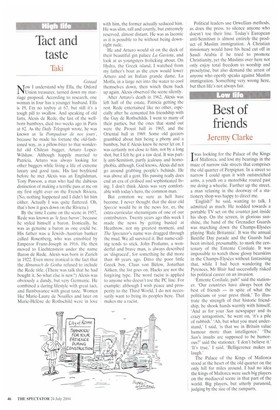Tact and taste
Taki
Gstaad
Now I understand why Ella, the Oxford Union treasurer, turned down my marriage proposal. According to research, one woman in four has a younger husband. Ella is 19, I'm no toyboy at 67, but still it's a tough pill to swallow. And speaking of old farts, Alexis de Rede, the last of the wellborn bumboys, died two weeks ago in Paris at 82. As the Daily Telegraph wrote, he was known as 'la Pompadour de nos fours', because he made his fortune the old-fashioned way, as a pillow-biter to that wonderful old Chilean bugger, Arturo LopezWilshaw. Although happily married to Patricia, Arturo was always looking for other buggers while living a life of extreme luxury and good taste. His last boyfriend before he met Alexis was an Englishman, Tony Pawson, a man who had the dubious distinction of making a terrific pass at me on my first night ever on the French Riviera. (No, nothing happened and I didn't hit him either. Actually I was quite flattered. Oh, that's how it goes down on the Riviera.)
By the time I came on the scene in 1957, Rede was known as le faux baron', because he styled himself a baron. Ironically, he was as genuine a baron as one could be. His father was a Jewish–Austrian banker called Rosenberg, who was ennobled by Emperor Franz-Joseph in 1916. He then moved to Liechtenstein under the name Baron de Rede. Alexis was born in Zurich in 1922. Even more ironical is the fact that the Almanach de Gotha refused to include the Rede title. (There was talk that he had bought it. So what else is new?) Alexis was obviously a dandy, but very Germanic. He combined a daring lifestyle with great tact, and flamboyance with great taste. Women like Marie-Laure de Noailles and later on Marie-Helene de Rothschild were in love with him, the former actually seduced him. He was slim, tall and courtly, but extremely reserved, almost distant. He was as laconic as it is possible to be without being downright rude.
He and Arturo would sit on the deck of their beautiful gin palace La Gaviota, and look at us youngsters frolicking about. On Hydra, the Greek island, I watched from my father's boat as the crew would lower Arturo and an Italian grande dame, La Moffa, in a large net into the water to cool themselves down, then winch them back up again. Alexis observed the scene silently.
After Arturo's death in 1962, Alexis was left half of the estate, Patricia getting the rest. Rede entertained like no other, especially after he cemented his friendship with the Guy de Rothschilds. I went to many of their parties, but the ones that stand out were the Proust ball in 1965, and the Oriental ball in 1969. Some old geezers grumbled about him being a phony and a bumboy, but if Alexis knew he never let on. I was certainly not close to him, not by a long shot, butt felt he got a raw deal. It was partly anti-Semitism, partly jealousy and homophobia, although, God knows, Alexis did not go around grabbing people's behinds. He was above all a gent. His passing really does end an era of civilised and sophisticated living. I don't think Alexis was very comfortable with today's hero, the common man.
But common we sure as hell have become. I never thought that the dear old Speccie would be in the news for, er, the extra-curricular shenanigans of one of our contributors. Twenty years ago this week I made the news by getting busted at Heathrow, not my greatest moment, and The Spectator's name was dragged through the mud. We all survived it. But name-calling tends to stick. John Profumo, a wonderful and brave man, is always described as `disgraced', for something he did more than 40 years ago. Ditto the poor little Greek boy, Claus von Biilow, Jonathan Aitken, the list goes on. Hacks are not the forgiving type. The word racist is applied to anyone who doesn't toe the PC line. For example: although I wish peace and prosperity to the Third World, I do not necessarily want to bring its peoples here. That makes me a racist. Political leaders use Orwellian methods, as does the press, to silence anyone who doesn't toe their line. Today's European anti-Semitism is almost entirely the product of Muslim immigration. A Christian missionary would have his head cut off in Saudi Arabia if he tried to promote Christianity, yet the Muslims over here not only enjoy total freedom to worship and proselytise, but also demand the arrest of anyone who openly speaks against Muslim immigration. Something very wrong here, but then life's not always fair.


























































 Previous page
Previous page